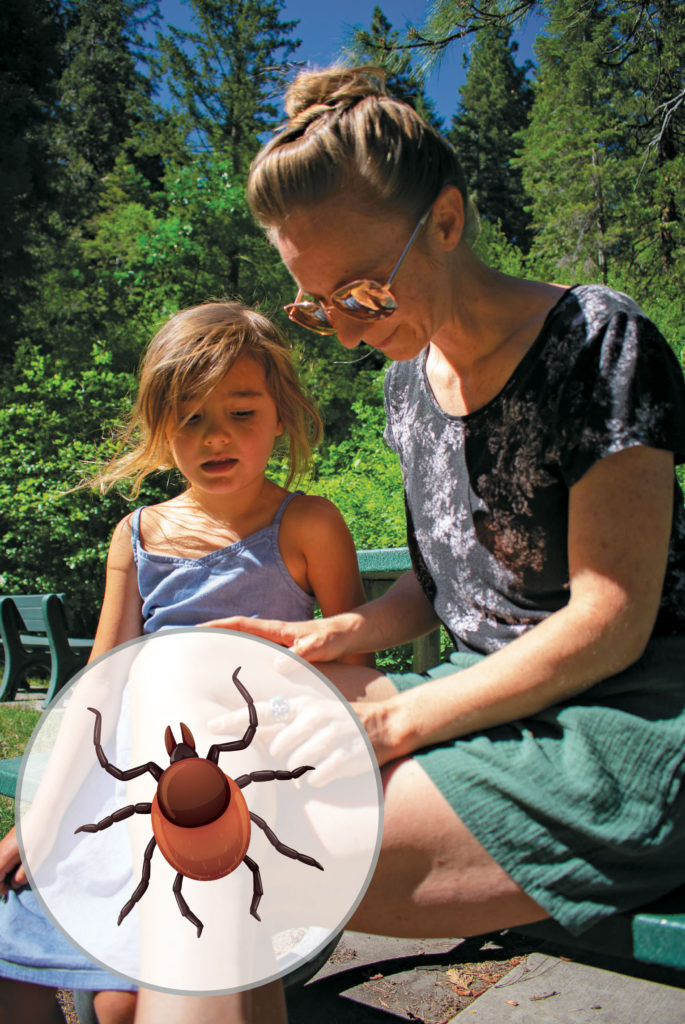 As the water rushed down my skin I brushed something on my back. It was stuck to my back in fact. Was it food from the kids’ sticky hands? I pulled and it came free in my fingers. I brought it close to my face to examine. What I found myself holding was completely unexpected. A TICK! In shock I dropped it and the tiny vector slipped down the drain.
As the water rushed down my skin I brushed something on my back. It was stuck to my back in fact. Was it food from the kids’ sticky hands? I pulled and it came free in my fingers. I brought it close to my face to examine. What I found myself holding was completely unexpected. A TICK! In shock I dropped it and the tiny vector slipped down the drain.
Despite my initial surprise, I didn’t think much of getting a tick bite. Living in an orchard, I had found ticks crawling on me now and again and I liked to think of myself as not too squeamish about those types of things.
In the months that followed I became increasingly short with my loved ones. I found myself having outbursts of yelling and then tears and then guilt over my uncharacteristic behavior. I started feeling anxious about everything and self conscious that those around me were judging me. When I was alone with the kids I was overwhelmed with fatigue, dizziness, and headaches that lasted for days with no relief. There was a sadness and deep fear that settled on me although I could never pinpoint the source.
Tick-borne illnesses have many neurological symptoms
When I began waking up at 3 a.m. hysterically crying each night and sobbing my way to 6 a.m., I realized I needed help. I began talking to a trusted friend and counselor, thinking maybe I was experiencing some sort of postpartum depression even though my youngest was almost a year old. My friend knew I wasn’t myself and began to suspect something else might be at play. She recommended I get tested for lead poisoning, which has some neurological symptoms like the ones I was experiencing.
As I sat in the doctor’s office and explained my symptoms, I was expecting to be told that I am a mother of two young children and I need to get more sleep and start journaling. What I heard instead was that I had every symptom of a tick infection called babesia, or babesiosis. According to the Centers for Disease Control (CDC), it “is caused by microscopic parasites that infect red blood cells and are spread by certain ticks.” Babesia is not the same as Lyme disease, Rocky Mountain spotted fever or several other diseases spread by ticks. I wasn’t sure how to take this news. I didn’t want what I had, but I also didn’t want a tick infection. It would be a relief to explain everything that had been going on — but not this.
Treatment can be a long journey
I have been treating my babesia for more than two years now. I started with nine months on an herbal protocol that had me symptom-free; but when I stopped the protocol all the symptoms returned. I have just finished 11 months on a more experimental treatment and am praying that I am no longer the host to this debilitating blood parasite. There are many routes of treatment for tick borne illness, one of the most common includes a high dose of antibiotics when diagnosis is made quickly. Because testing is often only 50 precent accurate and there is no one treatment that works for everyone, treating and recovering from Lyme disease and other tick-borne illnesses can be a nuanced journey.
Early treatment is important
Babesia is a blood parasite with symptoms most similar to malaria. Babesia, Lyme, and other tick-borne infections are all easier to treat if they are caught early. Because these infections have symptoms that are similar to many other diseases, doctors don’t always know to look for ticks as the root cause. The more you educate yourself on the risks of tick-borne illnesses, the more you will be able to prevent and catch them early.
If you find a tick, the CDC recommends removing it with fine-tipped tweezers, grasping the tick close to the skin and pulling upward with steady pressure. Place the tick in a plastic bag with a moist paper towel. According to the Lyme Center in Chico, CA, the tick can be sent to a lab at tickreport.com to be assessed for microbes.
Getting support — Chico and Redding
The Lyme Center in Chico offers support to those with Lyme Disease and other vector infections at meetings on the third Monday of each month 5:30 pm – 7pm. You can find more information, including local Lyme-literate physicians, on the website at thelymecenter.org. In Redding you can find support on the third Thursday of each month 6:30 pm – 7:30 pm upstairs in the Redding library. For more information on Lyme support in Redding follow Redding Lyme Disease on their Facebook page.
Preventing tick bites
The best way to fight tick infections is with prevention. Lymedisease.org provides the following tips for preventing tick bites when out and about in tick environments. Ticks tend to be near the ground, in leaf litter, grasses, bushes, and fallen logs.
• Wear shoes, socks, long pants and sleeves.
• Wear a hat and tie back long hair.
• Light colored clothing makes ticks easier to spot.
• Spray footwear with permethrin repellent.
• Use repellents with DEET, picaridin or lemon eucalyptus oil on exposed skin.
• Periodically inspect clothing and skin for ticks. Brush off or remove any that are found.
• Avoid brushing up against tall grasses. Stay on well maintained trails.
• Once home, shower right away. This will wash away unattached ticks and provide a chance to thoroughly inspect yourself.
• Running clothes in a hot dryer for 10 minutes will kill any ticks on them.
• Use tick protection for pets. Cats and dogs can bring ticks into your home.
Posted in: Health & Nutrition, Out & About
Comment Policy: All viewpoints are welcome, but comments should remain relevant. Personal attacks, profanity, and aggressive behavior are not allowed. No spam, advertising, or promoting of products/services. Please, only use your real name and limit the amount of links submitted in your comment.
You Might Also Like...

Adult Supervision: A Must To Prevent Drowning
As the weather warms up across the North State, families begin flocking to our lakes and rivers to enjoy boating, waterskiing, and swimming. And, with scorching summer temperatures typical in […]

Serving Up Sleep – Nutrients That Support Healthy Rest
Between midnight feedings, bad dreams, and bouts with the flu, most parents are well acquainted with the wee hours. Familiar, too, is the groggy haze that lingers the morning after […]

Fruits and Veggies for Families Eating Their Best on a Budget
Eat fresh. Eat organic. Eat a variety of fruits and vegetables every day. Sage advice, but isn’t it expensive? The good news is there are many economical ways to make […]

Paradise Dancefest – Circus de Paradise
This December 11th, Positive-I studio hosts their third Paradise Dancefest at the Paradise Performing Arts Center, featuring the exciting theme, “Circus de Paradise.” Geared for all ages, the show’s eclectic […]



